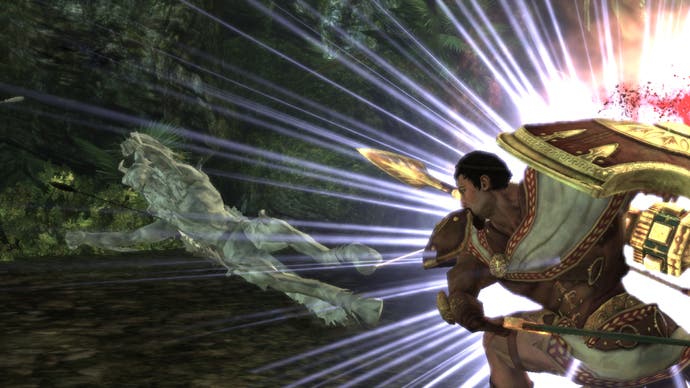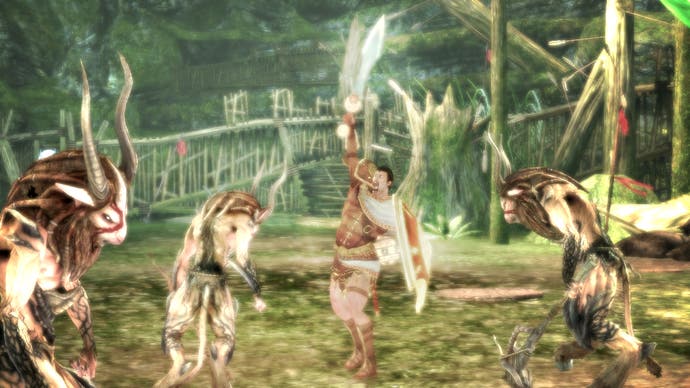Rise of the Argonauts
Fleeced.
Devoted followers of all things role-playing have been well served by the long-running battle between good and evil, and Rise of the Argonauts frames its re-imagining of Jason and his quest for the Golden Fleece in the starkest of traditional contrasts: Jason, already king and faithful protector of Iolcus, is set on his path by the murder of his new wife, Alceme, on their wedding day, by the suitably putrid, Hecate-worshipping Blacktongues.
It isn't long, however, before proceedings are sprinkled with welcome ambiguity. Jason seeks the Fleece not to serve the usual notions of loyalty, honour or selflessness but simply to resurrect Alceme, and soon finds himself in league with the gods Ares, Hermes, Apollo and Athena, all of whom will see their own interests served by his decision to abandon his people to the regency of Pelias, whose manner and dress sense are enough to illustrate Jason's rather daft decision, even for players who aren't aware of his role in the original Greek mythology from which Rise of the Argonauts borrows most of its cast.
After a fevered introduction to combat, Jason is initially consigned to trotting through the vast halls of his palace and the surrounding village passing on news to the bereaved families of guards killed in the initial Blacktongue assault, in-between listening to fortune-tellers, conversing with servants, noblemen-and-women and his guards about his duties to Iolcus (the ones he's not bothering with for the next ten hours), and the virtues of the gods and their various dominions. Apart from some sparring, there's little besides running around and talking for over an hour, before Jason finally takes delivery of his ship, the Argo, and sets off on a course to recruit the gods' descendants so he can locate the Fleece.

Conversation, which owes almost as much to BioWare in structure as it does to Greek mythology in content, does at least feed back into combat, as do the trivial tasks Jason performs before his departure and throughout the game. At certain points in conversation you're given several possible responses, and each choice represents a minor tribute to one of the four gods. Completed tasks - whether story-specific, incidental or combat-related - are recorded as Achievement-style deeds, which can be offered up to your choice of god as well. You can then invest the spoils of worship in more powerful attacks, passive bonuses and special "god powers".
Combat intensifies as Jason's quest takes him to the lands of Mycenae, Saria and Kythra, and while you're often flanked by your choice of two companions from the heroes you recruit along the way, they do their own thing, leaving you to concentrate on slaying Blacktongues, Ionians, minotaurs, satyrs and occasionally worse, using a mixture of sword, spear and mace, ever-blocking with your big golden shield. Along with the gods' boons, there are new versions of each weapon, which you receive at intervals (and can switch between back on the Argo), as well as new armour to uncover. However, your unlocks are linked to pivotal conversations and story events, rather than any overarching system. Your deeds constitute experience, and there's nothing else in the game to gather.

Simplification isn't always a bad thing, but sadly the result here feeds into a bland combat system, where despite the impressive towers of boons and god powers available to consider in the menus, the majority of conflicts are decided by two medium attacks followed by a hard "execution" blow, or by two successive execution strikes. From beginning to end, the most considered thing you have to do is occasionally switch from your favourite weapon to one of the others to suit a particular boss, or activate a god power to buff your attacks or reinforce your comrades, the choice of which doesn't have much bearing on wherever you're currently carving up the enemy, apart from different quips and incidental conversation around about the place. There are no combos to work towards, or ways to cooperate with your pals, and most of your enemies' attacks are basic, while their masters simply follow scripted patterns.








